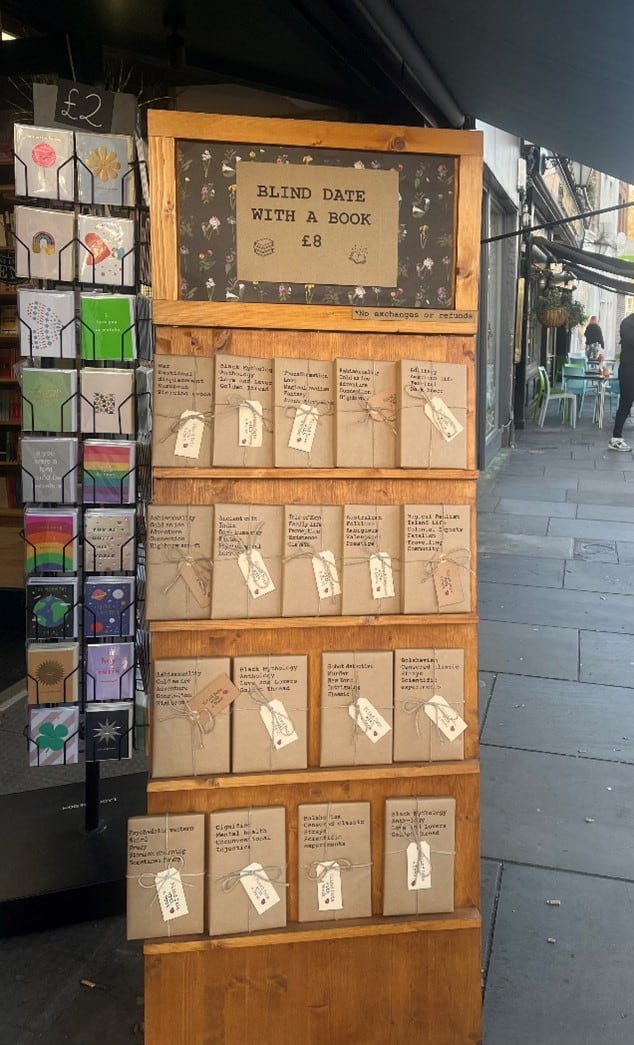A sideways look at economics
I was walking around Angel a few weeks ago when I came across a display of books outside a store, with a sign saying, “Blind date with a book”. The books were individually wrapped in brown paper, and the only thing differentiating them was a few words of description, printed in black. “Lost and found. Connections. Uplifting. Love. Enchanting,” was one, next to one that said: “Mythic. Silkworms. Contemporary. Epic saga.” You don’t find out which book it is until you’ve bought it. I didn’t need a new book, I have loads at home still waiting to be read; but curiosity got the better of me and I decided to buy one anyway. Seeing this as an opportunity to try something I wouldn’t normally read, I settled for a book described as “Robot detective. Murder. New York. Intriguing. Classic.” Any guesses?
This isn’t the first time I’ve been manipulated into buying something just because I had to find out what it was. One of my favourite stores growing up in Stockholm used to sell surprise bags, where for a few pounds you would get a bag filled with random jewellery and accessories, but you couldn’t know what they were until after you bought it. I bought one almost every time I went into that store – despite very rarely liking any of the products in it. These situations designed to pique our curiosity and generate sales are all around us – TV-shows that end on cliff-hangers, celebrities teasing upcoming projects, or companies that offer a “surprise gift” to customers that spend over a certain amount.
So why is this tactic so appealing? I didn’t need another book! I would have walked right past that bookstore without a second thought if the book covers hadn’t been hidden. Loewenstein’s information gap theory[1] provides some insight into my behaviour. It states that curiosity is elicited when people have their attention drawn to a gap in their knowledge, which makes them want to obtain whatever information will make that gap close. We don’t know which book is behind the wrapping paper, so to close that knowledge gap we need to find out, and the only way to find out is to purchase the book. Loewenstein said that the desire becomes stronger when we get more information about the book, since the more we know the nearer we get to closing the knowledge gap. He stated the example of a person knowing 3 US state capitals and a person knowing 47 of them – the latter individual is nearer to closing their knowledge gap, and so is more likely to be curious about the remaining capitals.
An experiment conducted by Hill et al. (2016)[2] demonstrates this. Participants were offered a mystery item for US$10, and were told the item would be worth at least that. One group was given no additional information, whereas the other got a few examples of what the mystery item could be. They then recorded their levels of curiosity and how likely they were to purchase the item. The results showed that curiosity was significant in predicting purchase motivation, and that people with more information were more curious and more likely to purchase the item than the group with less information. Another study asked participants to choose between €15 or a package of unknown content. One group was not told anything else, and the other was told whether the item was round or not. The same result was found here; the participants given more information were much more likely to choose the package. So, it seems like printing some words that describe the mystery book on the wrapping paper, rather than leaving it blank, was a smart move by the bookstore.
The book I ended up getting was The caves of steel by Isaac Asimov. I deliberately waited until the end of this blog to reveal the book, to create some suspense: did you find it worked? Science fiction isn’t what I would usually go for, but that’s part of the appeal with mystery items: you get to try something you probably wouldn’t normally buy for yourself! I am excited to start reading it, and feel hopeful that this will be one of those rare instances where being tricked by curiosity marketing has worked in my favour. I do think I’m unusually susceptible to this kind of tactic, consistent with my love for detective fiction and whodunnits — I just can’t resist a mystery. But clearly I’m not the only one – the lady in the bookstore told me that their ‘blind date with a book’ concept is their bestseller. Turns out that the most intriguing book cover is the lack of one!

[1] https://www.cmu.edu/dietrich/sds/docs/loewenstein/PsychofCuriosity.pdf
[2] https://www.sciencedirect.com/science/article/abs/pii/S0148296315003525
More by this author